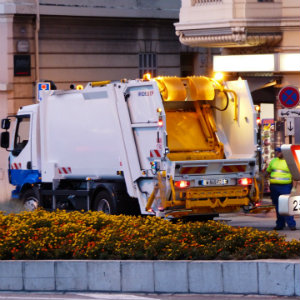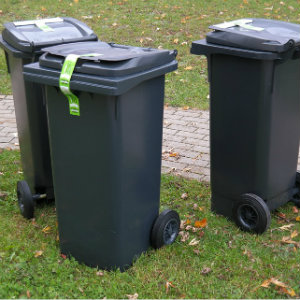Injured while working in sanitation? You may have such questions as:
- Who is responsible for causing my accident?
- Do I qualify for Workers' Compensation?
- How do I file a WC claim?
- Do I need to hire a lawyer?
Our lawyers are here to guide you through the complicated claims process so that you receive the compensation you need to recover.

Our experienced work injury lawyers are prepared to fight for the financial compensation you deserve.
Sanitation workers may be some of our most underappreciated civil servants. Without regular sanitation work, our streets would be overflowing with trash, dirt, and various other health hazards. Each day, these brave workers make sure that our cities and towns are clean. In the process, they expose themselves to a variety of risks and dangers.
Protections For Injured Workers
 Sanitation workers, like nearly all workers in PA, are covered by Workers' Compensation insurance. These are no-fault policies, and employees are covered regardless of who caused the injury.
Sanitation workers, like nearly all workers in PA, are covered by Workers' Compensation insurance. These are no-fault policies, and employees are covered regardless of who caused the injury.
When a work-related injury happens, Workers' Comp provides compensation for medical expenses and a portion of lost wages. This essentially acts as a contract between employers and their employees: Workers are financially protected when an injury prevents them from doing their job, and employers are protected from facing lawsuits when an employee gets hurt on the job.
This process sounds simple enough, right? Unfortunately, it's not always as easy as it seems. The claims process is complex and requires a close attention to detail. Many workers struggle to receive the compensation that they need because of various complications in this process. When these difficulties arise, an experienced work injury lawyer may be a necessary ally for injured workers.
FREE CONSULTATION
Dangers of Sanitation Work
Sanitation work is one of the most dangerous occupations in the US. According to a 2014 article by CNN on America's most dangerous jobs, sanitation workers are at a higher risk of work-related fatalities than both firemen and policemen and are more than 10 times as likely to die on the job than all other occupations.
These workers must be constantly vigilant of the dangers that surround them. Common hazards which may lead to injuries include:
- Impatient drivers attempting to bypass garbage trucks
- Pedestrians walking into the street
- Defective equipment
- Mechanical issues with trucks
- Falls while standing on back of the truck
- Slips, trips, and falls on unsafe walking surfaces
- Struck by flying objects
- Exposure to hazardous chemicals
- Exposure to sharp objects such as broken glass and metals
It's important for sanitation workers at all levels to consistently evaluate working conditions for proper safety measures. Adhering to these guidelines will help reduce the risk of an accident as much as possible. However, even when standards are followed to the letter, sanitation workers will still be at a relatively high risk of injury.
What To Do After A Work Injury
If you're a sanitation worker who's been injured on the job, you may have multiple options for pursuing compensation. You're automatically permitted to file a Workers' Compensation claim help with medical expenses and lost wages. Depending on the circumstances of your injury, you may also be eligible to file a personal injury claim in addition to your WC claim.
Filing A Workers' Comp Claim
Focus on the Workers' Compensation claim first. After you've been injured on the job, you should try to follow these steps:
- Seek medical attention - Your health comes first. Request medical care ASAP. This will help to limit the extent of your injuries, and to begin the process of documenting your injuries.
- Notify your supervisor - Provide your employer with a written report of your injury, no longer than 120 days after it. But preferably, you should notify your employer ASAP.
- File your claim - Officially file your injury claim with the PA Workers' Compensation Board.
- Request a medical report - Within 48 hours of your initial medical treatment, request a medical report from your doctor.
- Make sure your employer files a report - It's important to double-check that your employer has also reported the injury to the Workers' Comp Board and the insurance company.
- Request insurance statement - Contact the insurance company and ask for a written statement of your rights.
As you can see, this process relies heavily on proper documentation. Do your best to satisfy all of these requirements from the beginning in order to maximize your chance of earning compensation.
Personal Injury Claims
 If your injury was caused by someone who doesn't work for the same company, you may seek further damages in a personal injury claim. Filing one of these claims won't affect your Workers' Comp payments - you're eligible to receive both forms of compensation. Personal injury suits are applicable if a negligent third party contributed to your accident.
If your injury was caused by someone who doesn't work for the same company, you may seek further damages in a personal injury claim. Filing one of these claims won't affect your Workers' Comp payments - you're eligible to receive both forms of compensation. Personal injury suits are applicable if a negligent third party contributed to your accident.
Examples of sanitation worker accidents where a personal injury suit could apply include:
Auto Accidents
Sanitation workers in large metropolitan areas like Philadelphia are at an especially high risk of getting into an accident with passenger vehicles. Impatient drivers often attempt to dangerously drive around a stopped truck. When this happens, collectors often aren't seen in time and end up being struck by the vehicle.
Additionally, these restless drivers could end up colliding with the garbage truck or causing a multiple vehicle accident with other innocent motorists. These cases are handled just like any other auto accident. The victims of the negligent driver are permitted to sue for injury-related expenses, such as pain and suffering and loss of quality of life.
Slips, Trips, and Falls
Garbage collectors and other sanitation workers spend a good portion of their shifts moving through the streets on foot. This exposes them to possible walking hazards which could lead to a serious slip and fall injury. Examples include potholes, icy sidewalks, and broken steps.
When a sanitation worker suffers an injury from a slip or trip and fall, it's important to evaluate the property owner's role in the incident. All property owners have a duty to maintain the safety of their premises. If a failure to meet this duty results in an injury, that property owner could be held liable for injury-related expenses.
Defective Parts
Product manufacturers also owe a duty of care. When they put a product on the market, consumers have the right to expect that it's safe to use. If a defective truck part results in an accident and subsequent injuries, the manufacturer of that part could be held liable for injury-related expenses.
Do I Need A Lawyer?
If you want to give yourself the best chance of winning your claim with no headaches, we recommend having an experienced work injury attorney by your side. The right attorney will be able to assist you in the following areas:
- Gather documents you need for a claim
- Present sufficient evidence for the WC Board
- Guide you through the appeals process, if you've been denied already
- Identify possible liable third parties
Everything happens very quickly in a work accident. You may have trouble recalling all of the important details for your case. Legal counsel can piece together all relevant evidence and allow you to focus on recovering from your injuries.
Supplementary Pages
Monheit Law Montgomery County Office 215-866-2018
Directions to our Montgomery County Injury Law Office
4V4Q+FM Jenkintown, Pennsylvania
Open 24 hours
Sanitation worker injuries attorney Jenkintown
Civil law attorney
Employment attorney
Law firm
Attorney
Social security attorney
Monheit Law South Philly Office 215-302-0095
Directions to our South Philly Injury Law Office
WRCH+CP Philadelphia, Pennsylvania
Open 24 hours
Sanitation worker injuries attorney South Philly
Civil law attorney
Employment attorney
Law firm
Attorney
Social security attorney
